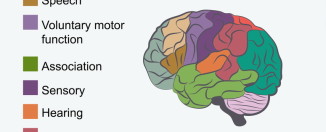Sleeping and Dreaming
Sleep is wonderful – when you’re tired, nothing feels better! But why do we need to sleep? And why do we dream?

First, let’s look at what happens when we are asleep. Humans actually go through 5 different stages of sleep in each cycle, and a sleep cycle lasts on average 90 minutes. The first stage is very light sleep where your muscles relax, and this stage is very easy to wake up from. In the second stage, your breathing and heart rate slow down, and so do your brain waves. In the third stage, the brain starts to produce delta waves which are very slow, long-period waves of electrical activity in the brain, and in the fourth stage, these delta waves are at their maximum size and slowness. At this point, you’re not dreaming. Instead, your brain is like a computer in “sleep” mode, where only the most basic operations are still running.
In the fifth stage, known as Rapid Eye Movement or REM sleep, your brainwaves change from delta waves to more excited theta waves. Your breathing and heart rate increase, so you’re in a more excited physical state. Luckily, your brain releases a chemical called glycine which stops your muscles from moving so that you don’t act out your dreams! If you sleep for 9 hours in a night, you’ll likely go through 6 periods of REM sleep in which you’ll be dreaming.
What happens in dreams? If you can remember any of yours, you’ll know that they are a strange mishmash of things you’ve encountered in your day-to-day life, mixed with fantasy and impossible actions, like being able to fly. Researchers don’t know exactly why we dream, but they know that if we don’t, we have troubles. In some experiments, people were woken up every time they were about to start dreaming, but they were allowed to have light and deep sleep. This resulted in them having anxiety, loss of appetite, and generally bad moods. They also had more trouble learning and mastering physical tasks. So dreaming is definitely important for our mental health, even if we don’t know entirely why.
The rest of the time you’re sleeping allows your body to heal damaged tissues (like bruises and broken bones), and to rest and ‘re-set’ tired muscles. It seems that delta waves also to help to coordinate your body’s internal clock, helping all your cells get in synch with each other so that they can work together to move your body and sense the world around you.





